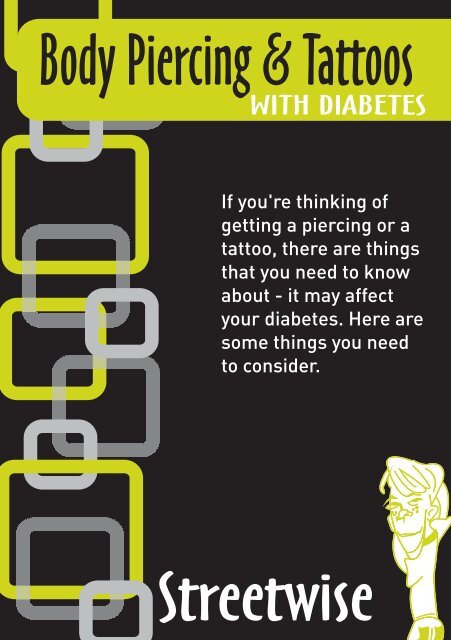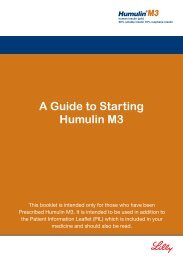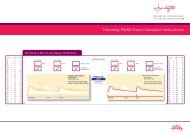Body piercing and tattoos with diabetes - LillyPro
Body piercing and tattoos with diabetes - LillyPro
Body piercing and tattoos with diabetes - LillyPro
Create successful ePaper yourself
Turn your PDF publications into a flip-book with our unique Google optimized e-Paper software.
If you'rethinking of<br />
getting a<strong>piercing</strong> or a<br />
tattoo, thereare things<br />
thatyou need to know<br />
about -itmay affect<br />
your <strong>diabetes</strong>. Hereare<br />
some things youneed<br />
to consider.<br />
Streetwise
"So you think you want your body pierced?"<br />
Piercing &tattoo's arereally fashionable,<br />
but remember <strong>tattoos</strong> are permanent, <strong>and</strong><br />
removing a<strong>piercing</strong> will often leaveahole<br />
or maybe ascar. Makesurethat youare<br />
100% certain that youwant a<strong>piercing</strong> or a<br />
tattoo beforeyou get one done!<br />
People have used <strong>tattoos</strong> & <strong>piercing</strong><br />
since ancient times as away of<br />
decorating their bodies, scaring their<br />
enemies, or showing their position in<br />
a society. Today they are regarded by<br />
some to be as fashionable as jewellery<br />
or designer clothes. However, they may<br />
be associated <strong>with</strong> problems which it is<br />
important to be aware of.<br />
Having <strong>diabetes</strong> doesn't necessarily<br />
stop you from getting atattoo or<br />
having a<strong>piercing</strong>, but thereare things<br />
to consider to try &prevent your new<br />
accessory from causing problems <strong>with</strong><br />
your <strong>diabetes</strong>.
Useful Tips<br />
�<br />
If youdecide that youare going to get<br />
something done, then use areputable<br />
place.<br />
� Some local authorities give licences to shops<br />
that offer <strong>piercing</strong> or <strong>tattoos</strong> <strong>and</strong> what that<br />
should mean is that the shop meets<br />
special hygiene st<strong>and</strong>ards to reduce the<br />
risk of infections.<br />
�<br />
�<br />
�<br />
Ask friends or family iftheyhave used any<br />
particular shops, <strong>and</strong> what theythought of<br />
it.<br />
Makesure the shop knows youhave<br />
<strong>diabetes</strong> beforeanything is done, they<br />
should ask youabout medical conditions<br />
but some don't.<br />
Try&make sure that youhave eaten<br />
something morethan 1hour before, this<br />
will reduce the chances of a hypo or simply<br />
fainting through being squeamish!!!
�<br />
�<br />
�<br />
�<br />
Ahelpful shop will be happy to answer<br />
any questions youhave, <strong>and</strong> to letyou<br />
look around their premises beforeyou<br />
choose to havea<strong>piercing</strong> or tattoo.<br />
Take someone <strong>with</strong> youwhen yougo.<br />
Thereare no legal restrictions on the<br />
age at which youcan haveyour earsor<br />
other body parts pierced. However,<br />
some establishments may require<br />
parental consent, or operate under<br />
local authority guidelines.<br />
It is against the law to get atattoo if you<br />
are under 18, whether youhave your<br />
parent's permission or not.
Put your health first<br />
Youshould not get a<strong>piercing</strong> or tattoo<br />
done if youare already unwell, or if your<br />
<strong>diabetes</strong> control has not been good<br />
recently.<br />
Poor control or illnessincrease the risk<br />
of problems after the <strong>piercing</strong> or tattoo<br />
has been done. Wait until youare feeling<br />
better &your blood sugarsare under<br />
control.<br />
Any <strong>piercing</strong> or atattoo means that the<br />
surfaceofthe skin has been broken (like<br />
having asmall operation) <strong>and</strong> the broken<br />
skin needs to heal.
Infections, what to look out for<br />
�<br />
�<br />
�<br />
�<br />
Any time the skin is broken there isa<br />
risk of an infection developing, <strong>and</strong><br />
<strong>with</strong> <strong>piercing</strong> &<strong>tattoos</strong> thereare 2<br />
types of infections that may occur.<br />
Youmay be at risk of catching<br />
infections transmitted in the blood<br />
(such as hepatitis), if the person<br />
performing the tattoo or <strong>piercing</strong><br />
hasn't cleaned &sterilized all of<br />
their equipment properly.<br />
Skin infections (bacterial infections)<br />
that may lead to serious problems if<br />
not treated quickly. These problems<br />
include diabetic ketoacidosis, toxic<br />
shock syndrome or blood<br />
poisoning.<br />
Thereisalso arisk of scarring (keloid<br />
scars) <strong>with</strong> <strong>piercing</strong>; these scars may<br />
be large &lumpy around the pierced<br />
area.
Afterwards...<br />
� The person performing the <strong>piercing</strong><br />
should give you advice onhow to look<br />
after the area that has been pierced.<br />
Follow this advice. Ask them beforeyou<br />
get a<strong>piercing</strong> done what advice they<br />
recommend. If they can't give you any,<br />
find somewhere else to go.<br />
�<br />
�<br />
�<br />
�<br />
�<br />
Alip or tongue <strong>piercing</strong> will make eating &drinking<br />
uncomfortable &difficult forafew weeks, <strong>and</strong> may cause<br />
unsteady blood sugars.<br />
If the area around the <strong>piercing</strong> becomes red, painful,<br />
swollen, or younotice any sticky yellowish coloured<br />
discharge then the area is likely tobeinfected. Youshould<br />
see adoctor immediately.<br />
If the area does become infected then youmight have to<br />
remove the <strong>piercing</strong> to help in treating the infection. To leave<br />
it in will make the infection harder to treat <strong>and</strong> increase the<br />
risk of scarring.<br />
Test your blood sugarsmore frequentlyifyour<br />
<strong>piercing</strong> becomes infected, <strong>and</strong> test forketones in<br />
your blood or urine. If your blood sugarsare high or<br />
youfind any ketones contact your <strong>diabetes</strong> specialist<br />
nurse.<br />
If youfeel ill in the first few weeks after youhave a<br />
<strong>piercing</strong>, then it may be because of an infection<br />
caused by the <strong>piercing</strong> -contact your <strong>diabetes</strong><br />
specialistnurse, as youmay be at risk of developing<br />
diabetic ketoacidosis.
Other leaflets are available in this series<br />
that may be particularly helpful for you:<br />
<strong>Body</strong> Piercing & Tattooing<br />
Drinking Safely<br />
Exercise<br />
Feet<br />
High Blood Glucose<br />
Home Blood Glucose Testing<br />
Hypos<br />
Insulin Pumps<br />
Looking After Type 1 Diabetes<br />
Sex <strong>and</strong> Beyond<br />
Sick Day Rules<br />
Top Tips for School<br />
Travelling<br />
Ask your <strong>diabetes</strong> team for the ones<br />
you want.<br />
Further information is available from<br />
Eli Lilly <strong>and</strong> Company Limited<br />
Lilly House<br />
Priestley Road<br />
Basingstoke<br />
Hampshire RG24 9NL<br />
Tel: (01256) 315000<br />
www.lilly<strong>diabetes</strong>.co.uk/patients<br />
Contact Numbers & Notes<br />
School Nurse: .............................................<br />
Diabetes Specialist Nurse:<br />
......................................................................<br />
Diabetes UK Central Office<br />
Web: www.<strong>diabetes</strong>.org.uk<br />
Email: info@<strong>diabetes</strong>.org.uk<br />
Tel: 020 7424 1000<br />
Juvenile Diabetes Research Foundation<br />
(JDRF)<br />
Web: www.jdrf.org.uk<br />
Email: info@jdrf.org.uk<br />
Tel: 020 7713 2030<br />
Samaritans<br />
Confidential help for anyone who is<br />
experiencing feelings of distress or despair,<br />
including those which may lead to suicide.<br />
Web: www.samaritans.org.uk<br />
Email: jo@samaritans.org<br />
Tel: 08457 909090<br />
ChildLine get help <strong>and</strong> advice about a wide<br />
range of issues.<br />
Web: www.childline.org.uk<br />
Tel: 0800 1111<br />
Ask Brook Free <strong>and</strong> confidential info for<br />
under 25’s<br />
Web: www.brook.org.uk<br />
Tel: 0808 802 1234 - free from all<br />
telephones including mobile phones<br />
Text: Ask Brook on 07717 989 023<br />
(st<strong>and</strong>ard SMS rates apply)<br />
Provided by Lilly as a support to medicine <strong>and</strong> patients <strong>with</strong> <strong>diabetes</strong>.<br />
This leaflet has been written by the RCN Children <strong>and</strong> Young People Diabetes Community (CYPDC).<br />
Lilly’s involvement is limited to printing cost <strong>and</strong> a review of the content for medical accuracy only.<br />
UKDBT00269a May 2012











![Humalog Mix50 (50% insulin lispro [rDNA origin] injection ... - LillyPro](https://img.yumpu.com/44269187/1/184x260/humalog-mix50-50-insulin-lispro-rdna-origin-injection-lillypro.jpg?quality=85)

![Humalog Mix25 (25% insulin lispro [rDNA origin] injection 75 ...](https://img.yumpu.com/35487335/1/184x260/humalog-mix25-25-insulin-lispro-rdna-origin-injection-75-.jpg?quality=85)



